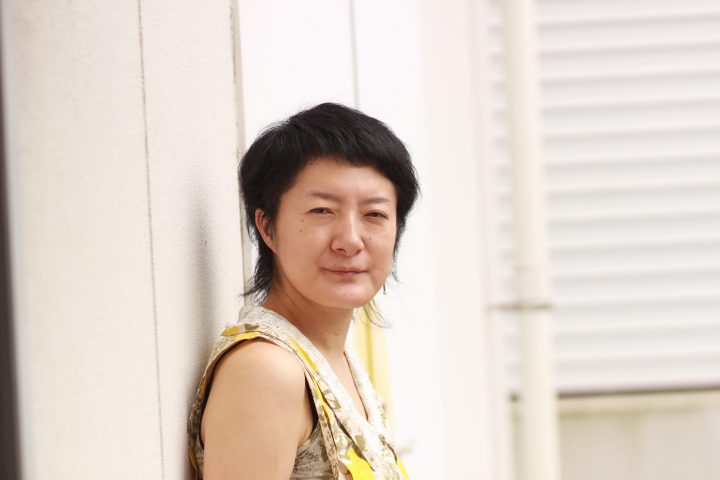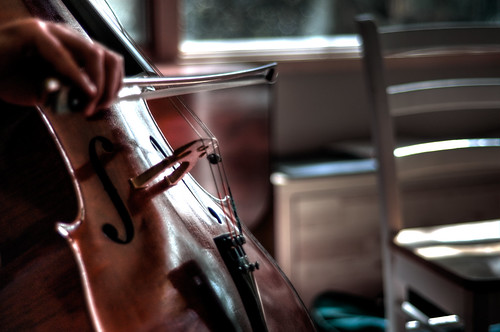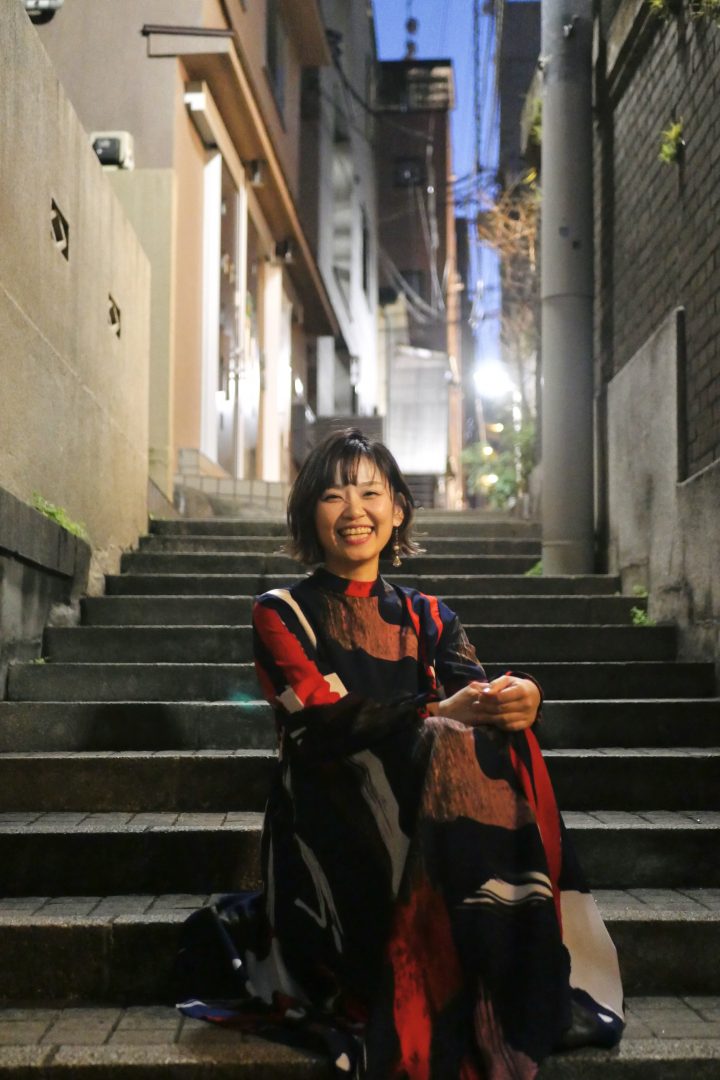What I want to teach children through music
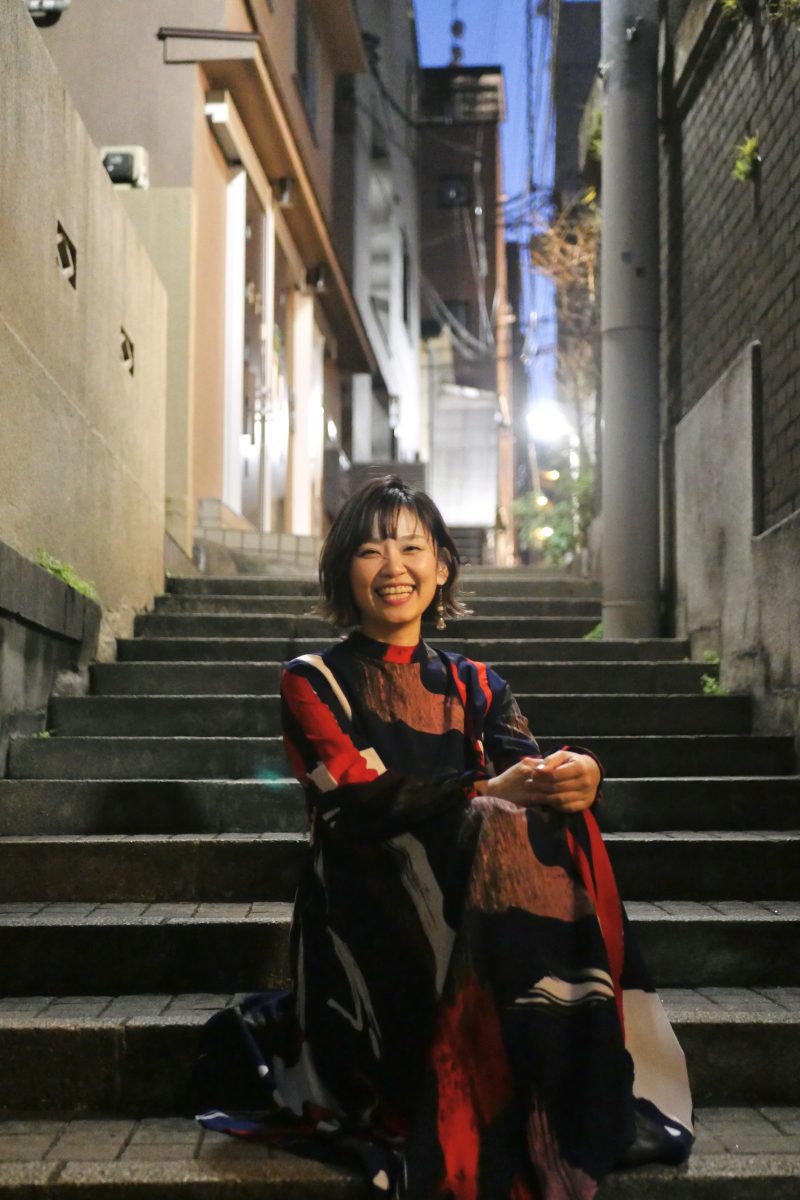
Minori is a singer-songwriter who runs a music school called "M's music" in Yokohama. She is active in a wide range of fields, including teaching special classes where children write songs together at kindergartens and elementary schools, and composing theme songs for companies and organizations.
This time, we asked him about what inspired him to start his musical career, how he has progressed up to now, and what his future holds.
My encounter with music began in my childhood
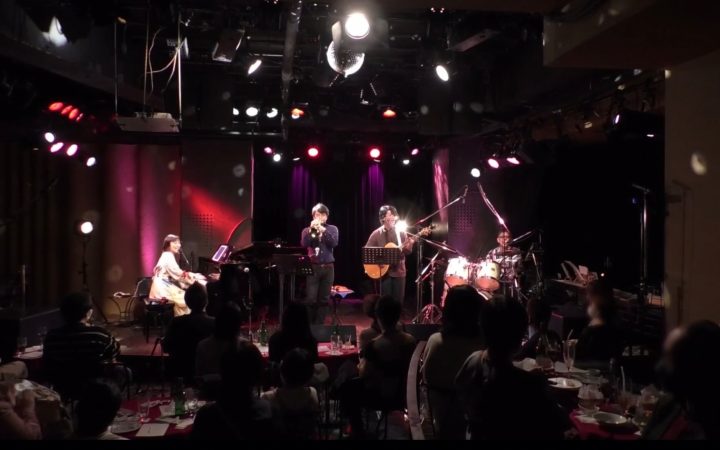
A live performance (Photo provided by Minori)
-Please tell us about your recent activities.
While performing live and on YouTube as a singer-songwriter, I also teach music at a music school in Yokohama. I produce background music for TV shows, musical plays, and short films, and I also teach special classes where I help elementary school children in Yokohama create songs from scratch as part of a "School Outreach Program" that provides live musical experiences.
-You're active in many different fields. I'm curious about all of them, but what got you involved in music?
My first exposure to music was when I accompanied my older sister to her piano lessons. Apparently she had wanted to play the piano since she was two years old, so I started going to her when I was three. My piano teacher at the time wasn't a special education teacher, but rather doted on me every time, and taught me that "music is fun" through various approaches, not just piano. I continued to learn piano at different piano schools in the third and sixth grades of elementary school, and although there were times when the practice wasn't just fun but also difficult, I took lessons from a teacher who was a part-time instructor at a high school with a music department, which led me to attend a high school with a music department. I also went on to a music university.
-How do you feel about continuing to play the piano and pursuing something that interests you?
Of course, I loved it and continued, but somewhere in my heart, I always had doubts. In high school, I was surrounded by teachers and friends who were serious about music, and in an atmosphere where going to music college was the norm, I felt like I couldn't escape this trend, and I felt pain and fear. Looking back, maybe the classical music field wasn't suited to me. As a teenager, I didn't understand the point of studying music from a different era, even if it was said to be a masterpiece.
Even after I entered music college, the desire to escape and quit remained the same. I asked my friends and seniors how they felt about practicing and playing, but I still felt confused. I guess I wasn't mature enough. Of course, that feeling has now been resolved, and I've come to understand the importance of studying classical music.
-Even though you loved doing it and continued to do it, there were long, difficult times.
When you're young and haven't yet fully developed inside, there are times when you have to overcome difficult things. I want to teach my children that "there may be a new view ahead." I believe that experience has led me to who I am today.
Days of uncertainty as I search for my own identity
-After graduating from university, did you work in a music-related field?
At first, I worked as a eurhythmics instructor at a cultural school. I really enjoyed playing music with small children aged 0 to 3. Rather than following set songs exactly, I improvised freely based on my reactions in the moment. Playing the piano while singing seemed to suit me very well.
After that, I discovered gospel music and while accompanying gospel singers on piano, I also started a team and began classes for adults. Without sheet music, I copied chords by ear and conveyed them using only the lyrics. If I felt like it, I would repeat a phrase. The music I created on the spot was very free and I could do whatever I wanted. It was a new discovery for me: I never knew there was such a world! I also developed a love for old jazz and joined a New Orleans jazz band.
Although I was able to expand my horizons beyond classical music and find it fun and suitable for me, I couldn't find the one. Perhaps it's just my nature, but I found myself wondering, "Why am I doing this?" I spent my early twenties going through many twists and turns, unable to find "music that really moves my heart."
-Even though you were inspired by a variety of music, you still had doubts. What happened after that?
At the age of 25, I started a music school for children called "M's Music." At the time, I was also teaching eurhythmics, so I needed a large space and a grand piano. I searched for a place that was comfortable and had the right environment, and found a good place in Yokohama, so I moved there and started by handing out flyers for the school.
However, once the music school got on track and I had a little more free time, I started thinking about my future musical activities. I wanted to use my skills in an activity! I wanted to provide something useful for the future! I began to think that way.
-So you've set a new goal that suits you.
When I was 28, I went to the 60th birthday concert of Hirotaka Nakagawa, a singer-songwriter, picture book author, and one of the first men in Japan to obtain a nursery school teacher's license. When I was little, I loved Nakagawa's CDs that we had at home and listened to them many times. His famous song is "Rainbow."
I was deeply moved when I saw Nakagawa's free-spirited playing style at the concert. Expressing himself without being boxed in. Freed from the fixed idea that "I have to do it a certain way," I felt a sudden release of tension in my shoulders and a complete change in my mindset. I decided to take a step forward without overthinking it and try to create songs that ooze from deep within me, and that I wanted to use music as a tool to express my true self.
-That's a big change in your mindset. Did it affect your activities?
Yes, there were quite a few.
Another person I met after that, comedian and singer-songwriter Takemori Takumi of the comedy duo Up Down, also gave me a valuable insight. I had a planned live performance of my own piano pieces, and when I contacted him because I wanted to sing Takemori's song "Your Hometown," he came to see the performance. After hearing me sing, Takemori said to me, "Haven't all your experiences up to now been the nourishment you needed to become a singer?" and "You should sing more." Those words encouraged me to start writing lyrics and composing music as a singer-songwriter.
The hesitation and discomfort I had felt while working on the music I loved for many years disappeared, and I finally felt that this was the style of expression I had been looking for!
I want them to grow strong through music
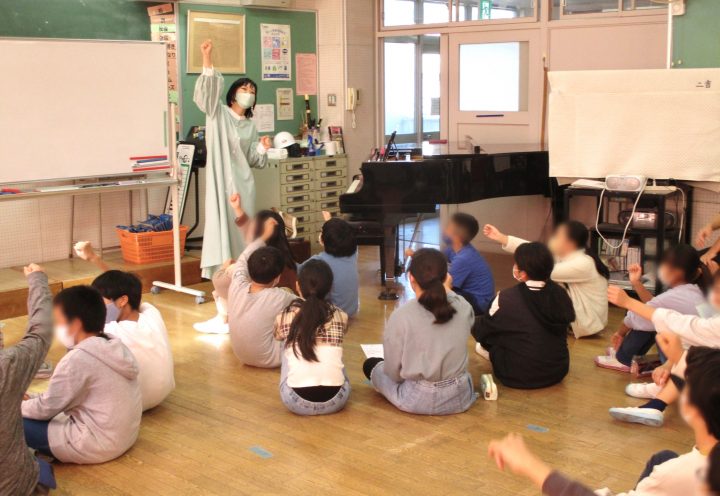
A music class at an elementary school (Image provided by Minori)
-I heard that you also teach special classes at elementary schools. What prompted that?
When a hall called "Midori Art Park (Yokohama City Midori Community Cultural Center)" opened in Nagatsuta, they were looking for artists to join, so I applied and was accepted as a pianist. During my activities, I became friends with one of the staff members. After a while, that person was transferred to Kanazawa Ward, but he remembered me and asked if I could give a class on songwriting at an elementary school.
We tend to think of music as something we receive, but it's actually something we can create ourselves. In fact, the reaction of most of the elementary school students I came into contact with at first was something like, "How do you make your own songs?"
-Indeed, when we think of music, we tend to think of it as something to listen to, or something to learn and practice from existing songs. What is a composition class like?
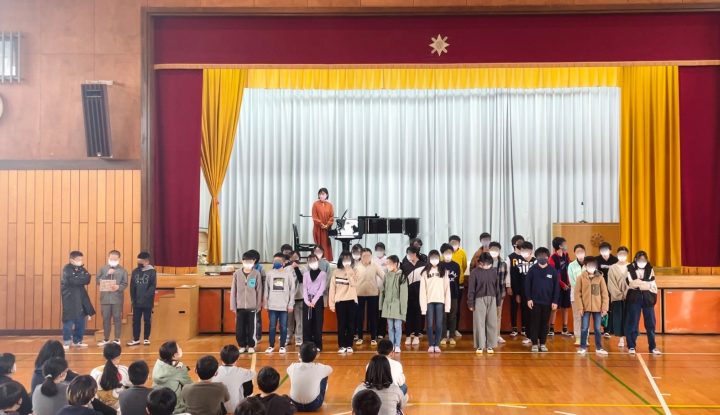
The class will consist of three sessions, during which the students will present the songs they have created (Image provided by Minori)
It depends on the request, but we generally offer a total of three lessons.
In the first session, the group uses popular songs as examples to get a feel for how songs are made, and then discusses the song they want to create. In the second session, they come up with lyrics based on the words they came up with in the previous session and try to put them to a melody. In the third session, they practice the completed song together and present it. At the end, they often reflect on their work and hold a mini-live performance.
The children are all surprised and delighted, saying, "I can't believe they can make a song by themselves." I don't think many people think of making a song, but anyone can do it if they take the first step. I hope that my classes will be an experience that takes them into the unknown and will lead to other things.
-This class is only possible because of your own experience.
I myself was unsure for a long time, and I think there are many people who are unsure in the same way. I don't want the children who will be responsible for the future to see adults who have given up, thinking, "That's all I can do," and think, "So that's what adults are like." I want them to live strong lives with hope. This feeling is what connects all of my current activities.
-Does the music school you run, M's Music, also have a curriculum that focuses on challenges?
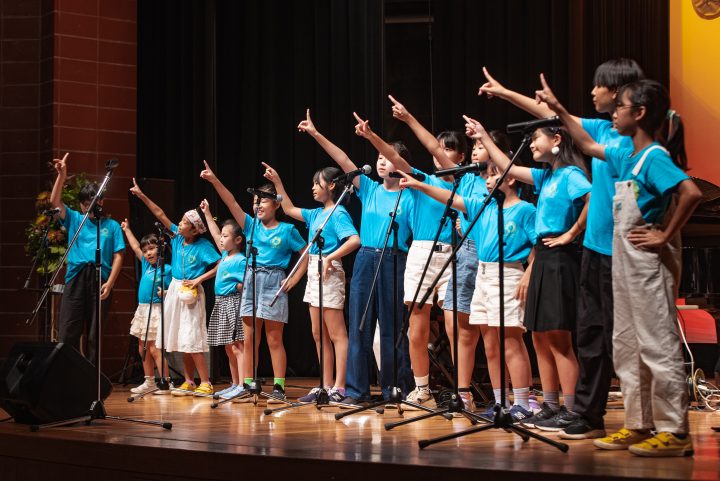
A recital for the music school she runs, "M's Music" (Image provided by Minori)
Our recitals allow students to perform in the style they prefer, including piano solos, ensembles with siblings, family, or friends, and some students even perform in bands with piano, keyboard, or singing accompanied by a professional bassist and drummer.
The children are also actively involved in the organization, and an executive committee has been formed with volunteers from third grade and above. At a meeting, they decide on the theme and the song for everyone to sing together, and then divide up the tasks. The stage banners, program covers, and decorations are all handmade by the children. The executive committee also divides up the tasks of hosting the event, making announcements at the venue, and managing the stage lighting on the day.
For the past three years, we have been experimenting with a "children's band" as part of our recital planning. Based on the concept of "just doing it ourselves!", interested children in the fifth grade and above form a band and perform without any guidance from a teacher, from song selection to instrument arrangement and stage composition. I was truly moved when I saw from the audience the stage performance that the children, whom I had been watching since they were toddlers, had completed on their own.
Finally, on March 31, 2024, they will be going beyond the recital and holding their first live band performance. The 11 students, who have experience performing in bands at recitals, are planning, running, and promoting everything themselves, through trial and error. They are constantly coming up with fresh ideas that adults don't have, and they are often amazed. Free admission is available from 3:00 PM at Machida's live music venue and jazz bar, "INTO THE BLUE." Please come and see it.
-It's rare to see a live performance created by students!
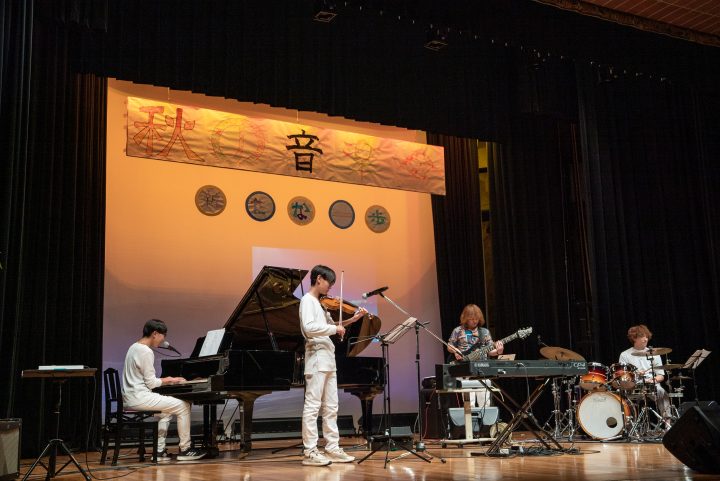
"M's Music" recital where you can perform with professional bassists and drummers (Image provided by: Minori)
In a typical recital, children perform within a set framework. Of course, they practice hard to achieve that goal, but somewhere in their hearts, they inevitably feel like "someone else will take care of it." Some children rely on others from the beginning, relying on adults to ultimately figure it out, but I think they can become stronger if they let go of that mindset. It's a child's privilege to fail, and I want them to try with the security of knowing that adults will watch over them, and to use whatever the outcome may be as a positive experience. As adults, we worry about leaving everything up to the children, but we're also excited to see what we'll see when we entrust them with such important work without any limitations. I want them to grow strong while enjoying the unknown. I hope they will grow by making the most of their strengths, weaknesses, and each individual's unique characteristics and abilities.
-It seems like it will be a good experience that will be useful even after you enter society.
We think, discuss, and create things ourselves. I feel like this is a microcosm of what it means to live in society. I hope we can continue this not just this time, but next year, and the year after. It will be a great inspiration for the young children who see this live performance, and by making them feel like they want to try it, I think we can create a cycle of continuing this type of live performance in the future. There will be difficult times in continuing to make music for a long time, and I don't think you can get through it just by having fun. Still, the memories of the great fun I had as a child supported me through those difficult times. I hope to help children develop an attitude of growing up towards a bright future, without lying to themselves or giving up on their feelings.
-I'm excited about the future of our children. Please tell us about your own future plans.
In addition to teaching music, I will also be actively working as a singer-songwriter. I would like to perform live acoustic shows in places I have never been to before. I am looking forward to the day when I can have fun with people I have never met before.
Harvest
Singer-songwriter / Music school owner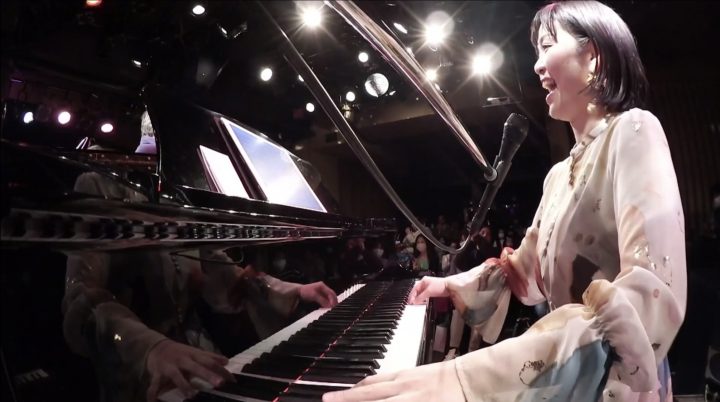
profile
Born in Saitama Prefecture. Graduated from the Tokyo College of Music's Piano Performer Course (Special Scholarship Student). Won the Silver Prize at the 2007 Young Artist Piano Competition, F Class. After graduating from university, while working as a pianist, opened a music school called "M's Music" in Yokohama. In 2018, she began performing live piano and vocal performances of her original songs. She is also committed to education, holding concerts at kindergartens and elementary schools, special songwriting classes, live performances and workshops at commercial facilities, and creating content. She provided an insert song for the NHK BS Premium program "First Train Story." She is also the author of the children's piano textbook "I'm a Pianist." Her other work includes background music for musical theatre and short films, and theme songs for companies and organisations.
Official links to Instagram, YouTube, etc.: here
For requests and inquiries to Minori: Click here
